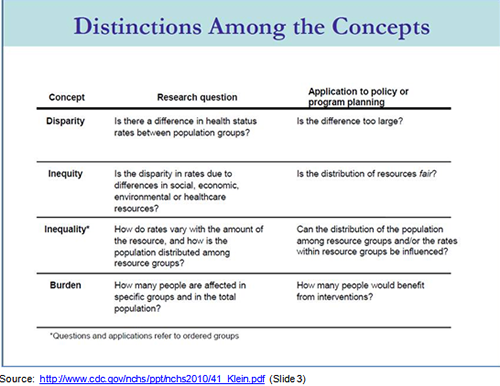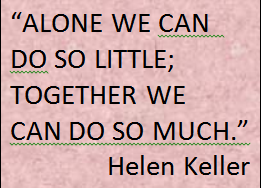Online Course
NRSG 780 - Health Promotion and Population Health
Module 6: Social Justice and the Social Determinants of Health
Ethics and Social Justice
Inequities vs. Inequalities vs. Disparities In Health


Health Disparities are “population-specific differences in the presence of disease, health outcomes, or access to health care” (HRSA, 2001). The key is that there are differences between populations in measures of health (e.g. rates of disease incidence, prevalence, morbidity, mortality, or survival rates).
Health Inequalities are equivalent to health disparities. Again, the issue is that there is a difference between the health status of one population compared to another population.
Health Equity is the “attainment of the highest level of health for all people. Achieving health equity requires valuing everyone equally with focused and ongoing societal efforts to address avoidable inequalities, historical and contemporary injustices, and the elimination of health and health care disparities” (Healthy People, 2020).
Health equity is the absence of systematic disparities in health (or in the major social determinants of health) between groups with different levels of social advantage or disadvantage (e.g. wealth, power, privilege – different positions in a social hierarchy) (Braveman & Gruskin, 2003). Equity implies social justice and fairness. It is an ethical concept, grounded in principles of distributive justice.
Health Inequity is the presence of differences in the social determinants of health that place groups of people who are already socially disadvantaged (for example, by virtue of being poor, female, and/or members of a disenfranchised racial, ethnic or religious group) at further disadvantage with respect to their health.
In the article “Health disparities and health equity: The issue is justice,” Braveman et al (2011) describes health inequities as:
- Systemic, avoidable, unfair and unjust differences in health status and mortality rates, as well as in the distribution of disease and illness across population groups according to race, ethnicity, socioeconomic position, gender, sexual orientation, or other characteristics that reflect social advantage or disadvantage.
- Sustained over time and generations and beyond the control of individuals.
- Resulting from an unequal structuring of life chances and circumstances.
- Arising from some form of social injustice such as racism, sexism, economic inequity, or political marginalization.
Health Equity Is Social Justice In Health

Think About the Following…
Imagine we are about to be born into the world, but we don’t know who we will be – nothing about our biology, sex, race, social class position or nationality. What rational, ethical rules would we agree to live by?
The concept of social justice refers to the overall fairness of a society in its divisions of rewards and burdens among the population. Most variations on the concept hold that as governments are instituted among populations for the benefit of members of those populations, those governments which fail to address the welfare of their citizens are failing to uphold their part in the social contract and are, therefore, unjust. The concept of social justice usually includes, but is not limited to, upholding human rights and promoting more equitable distributions of wealth and resources.
Have you ever thought of how social justice carries over into health and health care? Studying social justice helps health professionals (re)frame “the why of the why” to examine the upstream factors (or root causes) of both individual and population level health issues.
John Rawls, the most influential 20th century American political philosopher whose contribution to the idea of a just society, resulted in the well known book, "A Theory of Justice", will be discussed in the first mini-lecture of this module.
Click here to watch and listen to Dr. Jeffrey V. Johnson, professor emeritus and former director of the Office of Global Health discuss: “Social Justice as Fairness – Ethics of Johns Rawls”
Click here for a copy of the PowerPoint presentation that accompanies the presentation.
Ethics Of Social Justice
What are the Ethics of Social Justice?
- Emphasis on equality
- Emphasis on fairness
- Emphasis on freedom
- Emphasis on human rights
- Emphasis on collective action to protect those that are vulnerable in society
- Emphasis on action to transform structure of society that causes oppression and exploitation
Why study ethics?
- How should I act towards others?
- What are my most fundamental values?
- How do I want and expect to be treated by others?
- What do I consider “just” or “fair”?
- What are my “rights”?
- How do I work with “dignity & integrity”?
Key Moral Principles that Guide Actions of Health Professionals
- Respect for Autonomy of Individuals
- Non-malfeasance requires that we minimize harm and act with due care
- Beneficence requires that we maintain and enhance human dignity and life
- Distributive Justice requires that we seek a fair distribution of society’s benefits and burdens
Public Health Code of Ethics
These three components of the American Public Health Association (APHA) Ethical Framework specifically address aspects of social justice:
- Public health should advocate and work for the empowerment of disenfranchised community members, aiming to ensure that the basic resources and conditions necessary for health are accessible to all.
- Public health should address principally the fundamental causes of disease and requirements for health, aiming to prevent adverse health outcomes
- Public health programs and policies should incorporate a variety of approaches that anticipate and respect diverse values, beliefs, and cultures in the community
Source: https://nnphi.org/wp-content/uploads/2015/08/PHLSposter-95321.pdf
American Nursing Association - Code of Ethics
The following statements of the American Nursing Association (ANA) integrated into the language of Ethics Standards and Code of Ethics for nurses specifically address aspects of social justice:
- “The nursing profession is committed to promoting the health, welfare, and safety of all people.”
- “Nurses act to change those aspects of social structures that detract from health and well-being.”
- “The nurse has a responsibility to be aware not only of specific health needs of individual patients, but also the broader health concerns such as world hunger, environmental pollution, lack of access to health care, violations of human rights and inequitable distribution of nursing and health care resources.”
In summary, while it may seem easier to have discussions about the morality and ethics of certain specialized treatments and targeted practices than to truly consider the morality of the impact of certain types of health care institutions, policies, and the privatization of care on different communities, it is a critically important to foster dialogue among healthcare professionals. As the processes of globalization impact more and more communities and the healthcare landscape evolves, re-examining professional ethics and integrating the concept of social justice into practice is an excellent way to expand clinicians and researchers focus beyond the bedside, offering them a more global lens and a way to reflect and act on issues of health equity, distributive justice, and the “proper allocation” of resources to those populations in most need. Healthcare providers are in a strong position to become advocates not only for individual clients and families, but they can also empower clients to advocate for themselves and align themselves with clients’ priorities by supporting policies that may change their social determinants of health and ultimately improve health outcomes for all.
This website is maintained by the University of Maryland School of Nursing (UMSON) Office of Learning Technologies. The UMSON logo and all other contents of this website are the sole property of UMSON and may not be used for any purpose without prior written consent. Links to other websites do not constitute or imply an endorsement of those sites, their content, or their products and services. Please send comments, corrections, and link improvements to nrsonline@umaryland.edu.